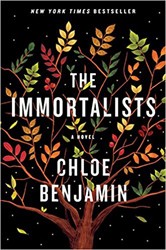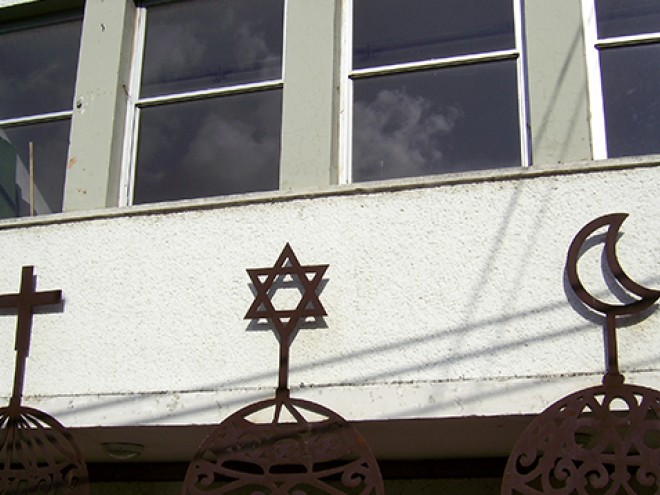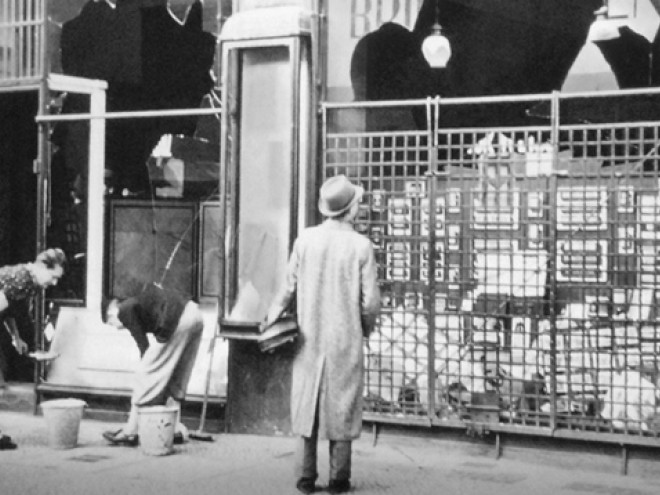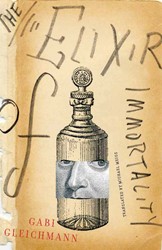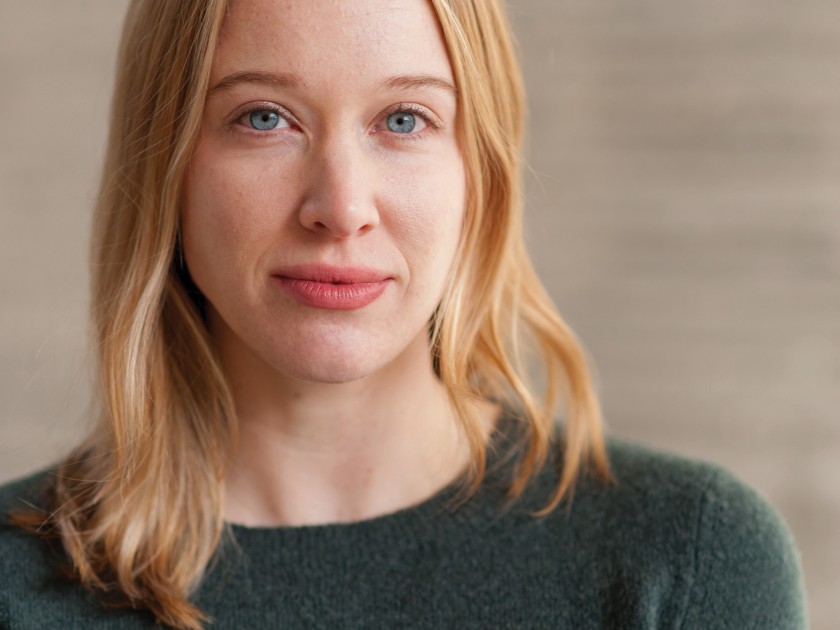
While there are vague references in the Torah to being rejoined with our ancestors in death, most of Judaism’s more concrete interpretations of the afterlife developed after the Torah was written. The only tidy conclusion we can make about the afterlife is that there is no single answer.
Chloe Benjamin’s most recent novel, The Immortalists, implicitly asks the question, would my life have meaning even if I knew precisely when it will end? Furthermore, would knowing exactly when I’ll die even matter? The novel follows the Golds: Simon, Klara, Daniel, and Varya, four Jewish siblings coming of age on the Lower East Side of New York City in the late 1960s. Early in their lives, they are each given a prophecy by a local fortune-teller — a Romani woman who claims she can predict the date a person will die.
The novel is the story of what they choose to make of their lives despite their hyperawareness of their own mortality.
Karah Preiss: When were the first seeds of The Immortalists sown? How much of the impetus for the novel came from your interest in your own roots?
Chloe Benjamin: In one sense, I started thinking about The Immortalists in 2013, but in another, the seeds were sown throughout my life. This isn’t an autobiographical novel, but it’s certainly a portrait of my psychology to some extent, in that the book’s preoccupations — fact versus mystery, religion versus atheism, knowledge versus uncertainty, health versus mortality — have long been my own. Part of that is just the way I’m wired, as someone who tends toward anxiety and a desire for control (as much as I know that control is often impossible). And part of it comes from the circumstances of my life. Having an unconventional family instilled in me an interest in families — the way they cohere and come apart, and the combination of intimacy and distance that exists between family members.
As for my own roots, I’m half-Jewish. Like the Golds’ ancestors in The Immortalists, my dad’s family were Eastern European Jews who came through Ellis Island during the pogroms and settled in New York City. My great-grandfather was a tailor, like Saul Gold, and my grandfather, like Simon, was meant to be his protégé (although my grandfather’s similarities to Simon mostly end there!). My grandparents were enormously helpful as I researched immigrant life in the early twentieth century. From them, I learned all sorts of vivid and wonderful details. Some made it into the book — such as the fact that my great-grandfather would bring my grandfather to Saks Fifth Avenue to buy the latest styles in order to make knock-offs for his own clientele — and others didn’t … like my great-grandmother burying fine silverware in the backyard when she thought it had been used for something non-kosher!
KP: The threat of anti-Semitism still looms large in Jewish communities today, especially with the renewed vigor of the alt-right. To what extent did you, as a Jewish person, feel an obligation to write a book about characters whose Jewish identities are a key element in the novel?
CB: I would like to think the world has learned from the unthinkable horror of the Holocaust, but issues of xenophobia and otherness are still alarmingly present — even more, as you point out, since Trump’s election. Racism, sexism, anti-Semitism, and Islamophobia only seem to be escalating, and that’s terrifying.
Seeing all of this, I felt an obligation as someone with a Jewish background — but also simply as a human being! — to write a book that was accountable to these times, and that didn’t shy away from politics. I wanted to explore how the Golds experience discrimination but also how they have privileges that other characters in the book do not. For instance, Raj comes to the U.S. as an illegal immigrant, and prejudice is more of a factor in his daily life than it is for the Golds of his generation.
I think part of the problem with this frightening political climate is that fear can make all of us smaller. It can make us more self-protective, more biased, even if we don’t mean to be. What is so hard — but necessary, I think — is to become more expansive right now: more curious, more empathetic, more aware of other people’s struggles. I tried to write a book that isn’t afraid of being critical, but that leads with compassion.
KP: Early in The Immortalists, the Gold siblings are given the fortune-teller’s prophecy of when they will each die. The four subsequent parts of the novel are snapshots of the four siblings in the order of these dates, leaving the reader with a sense that these are characters who are fighting for their lives. Growing up as a Conservative Jew in New York City, I was made very aware of our history as a people who have consistently struggled for our place in society, and was also constantly reminded of our minority status in the world, even when it felt like everyone I knew was Jewish. Do you think that the Gold siblings’ Jewish identity made them better equipped for lives that were marked by a ticking clock? I guess what I’m saying is, is there something about being Jewish that primes us for hardship?
CB: I think that can definitely be the case. There’s a moment in the book when Klara, who might be the most spiritual of the Gold siblings despite the fact that she isn’t actively religious, thinks, “if nothing else, Judaism had taught her to keep running, no matter who tried to hold her hostage. It had taught her to create her own opportunities, to turn rock into water and water to blood. It had taught her that such things were possible.” To my mind, the story of the Jews is one of endurance and creativity.
KP: The following is taken from your book: “God might be the greatest gift we give ourselves — the gift of sanity.” I agree with this entirely and am often confused by atheism because it seems far less rational to me — rather daunting. You grew up with an atheist father, an Episcopalian mother, and a Jewish stepmother. In spite of this confluence of religious ideas, do you still personally agree that a reliance on God is actually a safer bet than a life without any sort of higher power? What is your take on the whole “higher power” thing?
CB: My maternal grandfather was an Episcopalian minister, but in the past ten or fifteen years, my grandmother found herself struggling with faith in God. A few years ago, we talked about the idea of the envious atheist — someone who doesn’t believe, but wishes they did. I definitely wouldn’t call myself an atheist, but I am an envious agnostic. I absolutely agree that a world without God, where nothing happens for a reason and nobody is watching over us, is a far more disturbing thought than the reverse. And yet I find belief to be something you can’t fake. You have it or you don’t. And I struggle with belief — at least belief in a somewhat anthropomorphized, male-pronoun-ed God — for the same reasons Daniel does: because I have trouble seeing faith as more than a very human story. It is soothing. But how do we know we aren’t just making it all up?
I recognize that this sounds strange coming from someone who makes things up for a living. But it’s just where I am. On the other hand, what keeps me from being an atheist is that I firmly believe in how astonishing and mostly unknown the universe is. The idea that it spawned however many stars and however many planets and that billions of people are floating in darkness on one of them, unaware of what else is happening throughout this impossibly vast expanse — the wonder and magic of that feels like my version of religion. I think religion is always about holding space for awe, and mystery, and there’s too much mystery to be awed by for me to claim I have no faith in something beyond ourselves.
KP: In Judaism there are two related concepts: olam ha-zeh (this world) and olam ha-ba (the world to come). Judaism does not offer the relief of the heaven/hell binary, but instead directs us to live our lives meaningfully to make way for quality of our existence after death. Can you explain how you used the lack of the heaven/hell “escape hatch” as a formal constraint for the Gold siblings? How did it affect their approaches to mortality?
CB: This was a dichotomy that really interested me. Judaism seems like one of the only religions that makes no promises about the hereafter, and I couldn’t help but wonder how that would affect the Golds. Christians have this pretty idyllic idea of the afterlife, which would, I imagine, make it easier to face one’s mortality. But without that imaginative escape hatch, the Golds feel a much greater sense of urgency. As far as they know, here and now is all there is.
KP: The Romani diaspora is an important part of The Immortalists; the Romani psychic’s predictions are responsible for the entire trajectory of the novel. In reading The Immortalists, I wondered if you used this plotline to draw a parallel between the Romanis’ marginalized place in society and the Golds’ feeling of otherness as Jewish immigrants trying to establish themselves in New York City?
CB: Definitely. In general, I wanted to write a fictional world that reflects the diversity of the real world. Jews, as a group, have endured tremendous suffering. But I wanted to widen the lens, to show how other marginalized groups have made their way, too. The Romani have a lot of really interesting similarities to Jews, I think. They faced persecution in the Holocaust, but more than that, they are a traditionally itinerant group that has spread throughout the world by way of necessity and invention. And just as anti-Semitism remains a strong and tragically growing presence, the Romani face an immense amount of discrimination and xenophobia today.
While I have Jewish heritage — and grew up experiencing Jewish traditions, thanks to my stepmother, Ellen — I don’t have any such link to the Romani, and I was very nervous about whether I had the right to write about their community. I didn’t want to write a book that was filled only with people of my demographic, but I also didn’t want to speak for a group that wasn’t mine. Ultimately, I think that the project of fiction is to imagine your way into other lives, and that the best we fiction writers can do is to be diligent in our research so that we don’t fall into portraying stereotypes.
KP: Varya and Klara are both driven by metaphysical pursuits — science (primatology) and magic, respectively. Did you consciously choose their occupations to contrast with the rigid brand of Judaism they experienced in their youth? Or do you think they were attracted to such extreme disciplines because of their Jewish upbringing? Does superstition play into this at all?
CB: That’s so interesting — I hadn’t thought of Varya’s work falling into that framework, but the novel definitely has metaphysical concerns, Klara’s section especially. In Klara’s view, though, magic is actually connected to her Jewish upbringing. Despite Judaism’s aversion to soothsayers and divination, Klara finds in religion a powerful story of transformation and belief. Varya would like to think she’s more rational, but she engages in magical thinking of her own via OCD. Most of the characters in the book vacillate between faith and superstition. In the latter, there’s an element of fear and ritual, as in Varya’s OCD: If I do this, I can stop that from happening. Mainstream religion disavows superstition, but I think they’re intertwined.
KP: Simon’s storyline was a rich and devastating account of the gay experience in San Francisco at the onset of the AIDS epidemic. There is a tremendous amount of scholarship and fiction devoted to the AIDS epidemic, but the added layer of Simon’s desertion of his traditional, New York Jewish childhood was remarkably fresh. It also made me curious as to whether or not you were personally invested in telling his particular story. Was Simon completely made up? Did your ties to San Francisco have something to do with his character’s trajectory? What kind of research did you do in order to create his textured but short life?
CB: Simon’s story is at once very much not my own — I’m not a gay man in the seventies and eighties, of course — and immensely personal. I grew up in San Francisco with two sets of parents: one gay (my mom and her longtime partner, Molly), and one straight (my dad and Ellen). From the time I was a child, the LGBT community was a huge part of my upbringing, and so was a subtle but persistent anxiety about how other people perceived my family. You’d think that wouldn’t be an issue in the nineties and early 2000s, and in San Francisco especially, but we encountered plenty of passive-aggressive (and sometimes aggressive!) disapproval.
It was important for me to tell Simon’s story with compassion and nuance, and a lot of research. I looked at archival materials, from TV footage to old newspapers and photos, in order to get a sense of how that time looked and felt. I read memoirs and nonfiction, and watched documentaries. I interviewed men whose experiences mirrored Simon’s, and talked with people who were alive during the epidemic. I also researched the history of sex and sex work in San Francisco more widely.
KP: Did you learn anything new about Judaism — historically, socially, or culturally—while writing The Immortalists?
CB: One of the things I found really profound is the emphasis that Judaism places on words and stories. In a sense, Jews are their story. Language is a source of identity, sustenance, solidarity, and continuance. The Hebrew that is written on scrolls thousands of years old is the same Hebrew read today. It’s no wonder that Jews, as a diasporic group, have such rich intellectual traditions: stories are portable and, dare I say, immortal. When I internalized that, I wrote a section about the power of words — how you can’t keep them captive — that feels like the heart of the novel. As a writer with Jewish lineage, there’s nothing more inspiring than that.
Karah Preiss is a content creator and the cofounder of the online reading community Belletrist. She lives and works in New York City.
